#also scorcese makes way better mob movies
Explore tagged Tumblr posts
Text
I know Scarface is a classic but honestly how did so many people make it through this movie when they didn't have the option to skip all of Tony Montana's scenes? The man is so fucking annoying, I'm constantly hoping he's gonna get killed in every scene.
#text#I'm watching this for Michelle and that's the only reason#she's my favorite part of the movie#also scorcese makes way better mob movies#just saying#should've known it was gonna be a dud when I saw it wasn't him who was the director
0 notes
Text
Mean Streets (☆☆)
Year: 1973
Director: Martin Scorcese
Writer: Martin Scorcese & Mardik Martin
Violence, New York, gangsters, romance... tell me if you’ve heard this one before. ‘Mean Streets’ is Martin Scorsese’s third feature film and it sees him firmly within his own genre as a film maker.
Watching Mean Streets in retrospect is like watching a highlight reel for all the great Scorsese films to come. It has the wandering feel of After Hours, without any of the pitch black, absurdist comedy. It also has the locations, characters and the sleaze of Goodfellas; but, again, the inhabitants of Mean Streets don’t quite carry the same emotional realism as they do in that movie.
Ah, retrospect! It is no doubt a mistake to dwell on the other films of Scorsese whilst watching Mean Streets. And though it is impossible to shake, the familiarity of the world, characters and the motivations did not bother me. They were simply the cinematic seeds of a quality film maker with greater things to come. And the world is a rich one. Indeed, most of his New York-based films can find their roots in this sprawling world; Goodfellas and After Hours I’ve mentioned, but Taxi Driver can be found here as well (in a character played by De Niro, unsurprisingly). In finding these connections you can only applaud Scorsese’s maturity as a film maker, for there are a lot of ideas in here, and almost all of them are expanded with later films of greater depth and substance.
So what is the crux of the story? IMDB describes it as “A small-time hood aspires to work his way up the ranks of a local mob” – but this is not the story at all. This mistake says a lot about the film, because although the story line isn’t weak, I half expected it to kick into a higher gear at some point (no doubt because the ringing of Goodfellas was still in my ears). More fool me. The film is called Mean Streets and this is precisely what you get. The story plays out as a series of vignettes of Jonny Boy and Charlie as they work around the city collecting debts and drink in the evenings with their friends. We get stock characters such as the love interest and the powerful family member who disapproves of the love interest, but the film is simple in its plot movements. It is occasionally befuddling to have an inconsequential scene, however. For example, one scene introduces us to a lion in a cage at the back of the bar. Why is it introduced to us? is it important? Apparently not. It’s a reason which is never revealed and seems unnecessary by the end.
It’s stylish film, and generally well made. The soundtrack is frenetic and so is the editing. It has a quick pulse and, in some particular moments, is exquisitely acted (by the whole cast, but particularly De Niro). There is a sense that it is an early feature, though. Particularly in the beginning of the film I felt as if it was almost too stylish for any single purpose. In the opening there are a lot of cuts, changes on the juke box, big character intros (occasionally in slow motion), heavy red lighting, and heavy handed ‘I’m a geezer’ moments to show you that, in fact, they are geezers after all. These are scenes the cast and crew had a lot of fun making, and in a way they’re effective and fun, but in another way they’re sophomoric. Compare with the opening of Taxi Driver four years later with that sumptuous Bernard Herman score and the equally gorgeous shots of a neon soaked, steaming NYC, and the contrast is sharp. I’m sure that the contrast was even sharper in Martin’s head as well.
This is a perfectly good movie, it’s just that its offspring are so much better. But as a portal into a young Martin Scorsese’s mind and his manifesto on film making, this is as good as you can find.
27/10/2019
1 note
·
View note
Photo
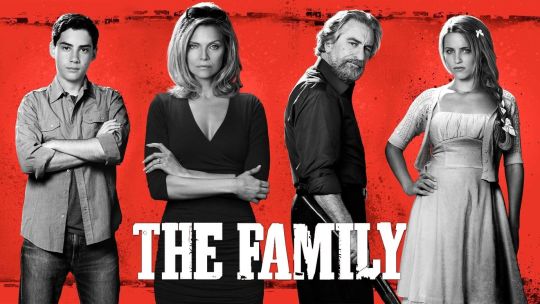
FILM | The Family (2013, dir. Luc Besson) Welcome to a mafia movie if it were rooted more on comedy than drama. And for the most part, it actually does work. But I won’t lie to you, it still just feels like another mob movie. It almost got me there, because it’s from a different perspective and a slightly different tale... before falling short during some crucial scenes.
Brace yourselves, this is a long one with lots of spoilers.
Giovanni Manzoni (Robert DeNiro) is a mafia boss that *gasp* snitched – but in his defense, there were attempted his on his and his family’s lives; it’s what any patriarch would do. For the obvious reasons, he and his family are put under Witness Protection and are relocated. And when we catch up with the Mazoni’s, we don’t have a clue how many times they’ve been relocated, but it’s obvious this isn’t their first rodeo. They are on first name terms with the Fed in charge of their seemingly constant relocations (Tommy Lee Jones as Robert Stansfield), as well as the two other agents set up in the safe house across the street from their new home.
This was a moderately fun movie; acceptable for DeNiro fans, good for a few good chuckles, and for those of us Italian-Americans, at least one moment where you could definitely relate. But I thought it felt underdeveloped in some spots. Or, overdeveloped in the wrong places. Regardless, it left me wanting more; eventually I just got bored and wanted it to be over, keeping my fingers crossed for something, anything, to give it a redemptive twist. Sadly, it’s just another mob film that revolves around that typical “taking people out who have wronged me” violence we always see in these tales.
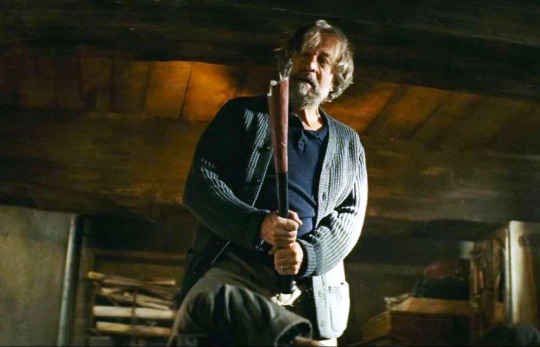
Robert DeNiro is a great actor, but Gio was a little boring to me. Gio writing his memoirs – revealing all that he’s experienced as a boss – was intriguing and an obvious opportunity to provide backstory, but It would have been MORE interesting if something had actually become of his manuscript. Furthermore, I found his “why is the water from my faucet brown?” arc bland. Was that really the best writers of this movie could do? Gio going around shaking people down for answers in typical mob guy fashion? I suppose he was to be laying low, mostly sequestered to this little old French house with not much to offer, and it was a way to give Gio a more personal touch, a sense of activism to help himself and ultimately the community, but I have to believe there was something better that could have given him to occupy his time. At least he ended up in a decent scene: a film debate/discussion amongst the locals where, in a turn of events, he found himself talking about topics related to Goodfellas (pssst, for those that don’t know, DeNiro also starred in Goodfellas). But mostly, I just think The Family is just an aging DeNiro starring in the same stuff he’s always done. It makes sense when you see Martin Scorcese’s name as a producer.
I had a little more interest in Maggie (Michelle Pfeiffer), but only a smidgen more and really because of her culinary related scenes. The first, when she brings a snack to the FBI agents in the safe house – roasted peppers doused in olive oil and garlic. I literally said out loud how delicious that sounds (yes, my Italian is showing). And while I don’t necessarily agree with what she says in denouncing the French use of butter and cream in the majority of their dishes, her description of the effects of olive oil versus butter in the body was a fantastic scene. Other than that, her only major arc was related to going to church and attempted redemption through religion, which is all too typical Italian-American fare in film. Again, like DeNiro, her character was just so typical of a mafioso’s wife.
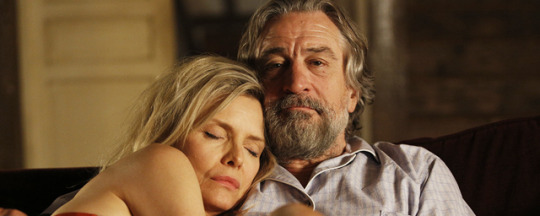
The way The Family differs from other mob films I’ve seen is that viewers get a bigger glimpse into the kid’s point of view. Which might be why I feel the arcs of Belle and Warren overpower that of their parents. They had so much more memorable aspects that I just didn’t have with Gio or Maggie.
With Belle (Dianna Agron), we have the “girl next door” with an attitude and edginess thanks to her place in this hardened family. Honestly, I think they did her dirty with her arc and character. Belle becomes infatuated with a college-aged substitute teacher that we ultimately see in an overly dramaticized look at teenage love. How could a girl that beat the crap out of a boy her own age earlier in the film (for good reason, more on this later), who was also savvy enough to seduce the aforementioned teacher in the first place, be the same girl that wanted to commit suicide because of unrequited feelings? I call lazy writing (**SPOILERS** it is on that rooftop where she contemplates death that she sees incoming trouble for her family). Even later, during the final fight scene, we see Belle quite literally prancing away and crying while trying to escape the bad guys, despite having just shot them up in a pretty badass way mere minutes before. MAKE UP YOUR MIND, PLEASE?!?! I found my feelings about her character bounce back and forth with each scene. Girls next door can still be feminine and hold their own in the face of danger. Psh.
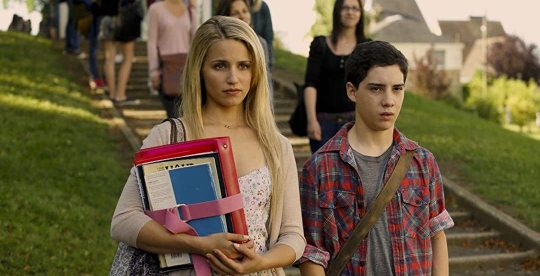
And while Warren (John D’Leo)’s narrative isn’t as dramatic as his sister’s, his role in the overall story was just silly to me. First of all, this kid is mastermind enough to collect information about his fellow classmates at his new school in record time, and create a resulting “mini mafia” system to not only take down the school bully but also make profit from his fellow students. Like, this boy has got skills for sure. But Warren is also sloppy. He has the abilities to create such an amazing thing for himself... yet apparently wasn’t capable of keeping all his goings-on underwraps and was confronted by school faculty. Again, I say lazy writing, as his role was the same as Belle’s in ushering the final conflict of the film (like legit, it his slip up that makes the whole ending happen). But at least I’ll say it is more realistic in the repercussions of his actions; we see schoolyard violence often enough in film, but not always the punishment for doing so.
This is very obviously not a perfect film in my eyes. Especially considering they neglect how the Witness Protection Program actually works – YOU DO NOT JUST CHANGE YOUR LAST NAME, GUYS. Only Gio changes his entire name to his new identity, “Frank Blake.” The rest of his family maintains their same first names. This and other details throughout the film honestly just bother me to no end.
Buuuut.... I love that we see each family member handle things on their own against those that wrong them throughout the film, while simultaneously doing their part to defend their family. Of course we expect acts of brutishness from Gio, that’s just what he does and how he rolls. Then, however, we see Maggie, at the grocery store asking for the overtly American specialty of peanut butter, and the townspeople begin badmouthing Americans because of it. So what does she do? Sets off a little explosion in the back of the store that starts the place on fire as she walks away. And Belle has the previously mentioned tussle with a group of male classmates, when one is being a gross greasy boy wanting to take advantage of her at a park when she merely just needed a ride home. Not only does she hit him with a vicious right hook, but she also finds a tennis racket in the trunk of the car and continues to pummel his disgusting ass while simultaneously giving a stern lecture on how to treat women and how important women are to the men’s futures (again, how does this badassery get so warped later on for her?) Similarly, young Warren’s run-in with the school bully allows us to see how masterful his skills are for utilizing his knack for collecting information and creating a well-crafted pull with the other students as a result (class nerds and rugby players alike) to give that bully exactly what he deserves. Not surprised at all that each and every one of the Manzoni’s/Blake’s would handle matters with violence, as all good mafia families do. And it’s equally not shocking at all when **SPOILERS** we see them drive off into the distance to start anew again at the end of the film. I was, however, constantly waiting for this wonderful moment at the end of the film where I believed the entire family was going to fight together, literally side by side. And it never happened. Honestly, the big gunfight between the Manzoni’s and the Don(s) he betrayed felt so anticlimactic I think because of this fact. We know they’re all capable of holding their own separately as they’ve already demonstrated, and they did it separately again here at the end, though at least in the same vicinity. But just think how beautiful it would have been to actually do it all as a true family unit, as was seemingly impressed upon us throughout the film.
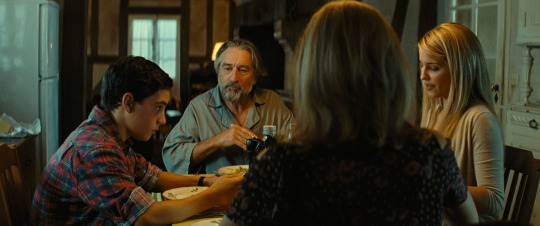
I know The Family is not supposed to be some award-winning dramatic piece of cinema. In fact, some if not most reviewers call it a satire of the mafia trope or dark comedy. But I think Ben Nicholson of CineVue (found via Rotten Tomatoes) says my general assessment quite well: it is ���acting Goliath [DeNiro] as a now all-too-familiar caricature of the parts that made his name.”
Frankly (ha! see what I did there?), I would say it’s a film I might put on as background noise as I often do with the television when I stay up late these days, but only if I’m truly desperate; I would not actively pursue watching this one again.
OH! I do like fun facts though: like that this is the first time we see legends Tommy Lee Jones and Robert DeNiro together in a film. Only took forever, right? And apparently there’s another with these two coming out later this year, a remake of The Comeback Trail. Equally so, The Family was actually based on a book called Malavita by Tonino Benacquista. How much you wanna bet the book is better?
#film#films#movie#movies#cinema#the family#the family (2013)#robert deniro#michelle pfeiffer#dianna agron#john d'leo#mob#mafia#mafioso#tommy lee jones#dark comedy#satire#quarantine#quarantine entertainment#movie night
0 notes
Text
Oscar Reviews 2020 - The Irishman
Rating 6.5/10
I will start by saying I don’t think this movie was made for me. I was very much not the target audience. This movie was a nostalgic moment for both the director and actors and the audience who grew up watching many members of the ensemble in a variety of mob movies since the early 1970′s. Scorcese’s latest directorial work is an homage to a time when the ins and outs of the Italian mafia mesmerized many. Unfortunately, I do not think the slow pacing storytelling of an Irishman and his tight relationship with the Mafia is a cinematic experience that was needed in 2019/2020.
The movie itself is three hours, often filled with scenes that leave you wondering whether they were left in to add to cinematography (which they don’t) or whether Scorcese just did not feel like taking anything out. The pacing of the movie did, however, make me feel the story would have been better as a mini-series where more time could have been put into remembering the many characters and events throughout a lifetime, as well as absorbing the characters more.
Either way, the performances of the actors carried the story and kept you engaged. Al Pacino’s portrayal of Jimmy Hoffa was so well done, I found myself focusing more on Pacino’s story than even De Niro as the lead. The costume and set design also really helped to create the 60′s feel which was well done. All in all, the movie is a slow watch that requires way too much attentiveness from it’s the audience. Though it is a well-made film, especially for Netflix who continues to put throw their hat into the ring of cinematic prestige. If anything both Pacino and De Niro deserve their Academy nominations and it would be satisfying to see Pacino win. The movie’s nomination for best director, costume design, and production design all seem well earned, though the competition is quite fierce in all categories.
0 notes